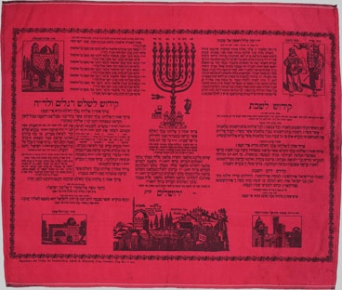ANNIVERSARY: The Prague publisher Jakob B. Brandeis
září 2005

Prayers and blessings for the sukkah, Sabbath and holidays Prague, Jakob B. Brandeis, 1880-91 printed on silk, inv. no. 71.484, 460 x 550 mm
The Prague publisher Jakob B. Brandeis died on 20 September 1912. He was the founder of a publishing house and bookstore which, from 1880 onwards, provided the Jewish community with Hebrew prayer books and fiction, as well as educational literature on Jewish topics, mostly in the German language. Jakob B. Brandeis was born in Prague on 3 June 1835, the offspring of an old and distinguished Jewish family. His father Berman (d. 1859) was a Sappers captain in Napoleon’s army and later the chief cashier and procurator at the Simon Lämmel Banking House in Vienna and at the Prague branch managed by Lämmel’s son, Leopold. His grandfather, Baruch Brandeis, was a rabbi and assessor at the rabbinical court of the Prague Jewish community and the author of the religious works Leshon Hakhamim and Tzeidah Baruch. Among Jakob B. Brandeis’s ancestors was Moses Brandeis, the son-in-law of Rabbi Loew; his wife was the daughter of the second leading Prague-based publisher, Wolf Pascheles. Originally a journalist, Jakob B. Brandeis was involved in current Jewish topics and active against manifestations of anti-Semitism throughout his life. From the 1860s he wrote articles for periodicals in Prague and Vienna and from 1881 he shaped the form and content of the Illustrated Israelite Folk Calendar (Illustrirter israelitischer Volkskalender), which he published himself. In 1864 he established a printing house; his publications were printed by this house and by another Prague printer A. Haase. After his father’s demise, his son Richard, himself a printer since 1895, took over the direction of the publishing. At the beginning of the Second World War, Richard published the last edition of Brandeis’s Jewish Calendar (for the year 5701 = 1940-41), this time in Czech; in December 1942 he was deported with his wife to Terezín, where he died on 10 April 1944. Brandeis’s publishing house and bookstore was based originally on the Old-Town Square and, from 1892, in Celetná Street. In 1899 Brandeis opened a branch in Wroclaw (Breslau). Brandeis’s Jüdische Universalsbibliothek was a series of cheap editions that popularised many works by Jewish authors. In addition to literature, the Brandeis bookstore also offered ritual appurtenances, such as tefillin bags, prayer shawls, candelabra and decorative and devotional printed sheets for Jewish households; these contained motifs of the Old-New Synagogue in Prague as well as depictions of major biblical figures (Moses and Aaron, David and Solomon) and personalities of the day (such as Sir Moses Montefiore) Among this type of work produced by Brandeis is a silk textile with blessings over wine (Kiddush) for the Sabbath, the three pilgrimage festivals and the New Year and with the text of the ceremony of Ushpizin (Guests); this text invites the biblical patriarchs, Moses, Aaron and Kind David into the sukkah – the tent or hut where the Jews dwell during the Feast of Tabernacles. The textile is printed by the letterpress method and decorated with woodcut motifs taken from other types of Jewish devotional plaques (shiviti, mizrah, Yahrzeit), the menorah with Psalm 67, the figures of Moses and Aaron and pilgrimage sites: Machpelah cave with the tombs of the patriarchs near Hebron and the tomb of the matriarch Rachel near Bethlehem. Vedutas depicting the panorama of Jerusalem with the Western Wall (a relic of the Temple of Jerusalem) and Mount Zion recall the holiest site in Judaism, to which, throughout the many centuries in exile, the hopes of the Jewish nation are attached as a symbol of redemption and national and spiritual renewal.



![[subpage-banner/6_Media.png]](https://c.jewishmuseum.cz/images/subpage-banner/6_Media.png)
![[homepage-banner/incident.jpeg]](https://c.jewishmuseum.cz/images/homepage-banner/incident.jpeg)